FOLPET
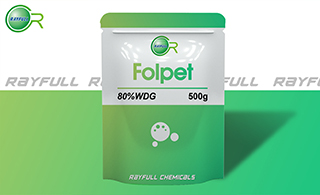 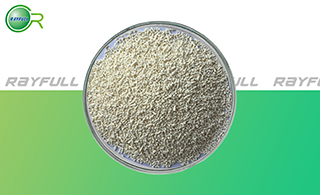 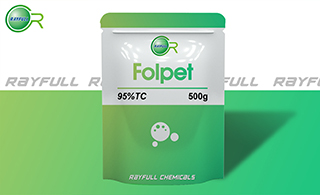 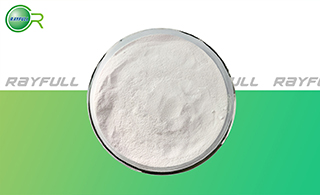 灭菌丹 灭菌丹
Introduction: A protective fungicide used for broad spectrum control of fungal pathogens including downy mildew, powdery mildew, leaf spot, rose black spot, apple scab, rose mildew, etc on fruits including apples, cherry, berries; ornamentals including roses and vegetables.
Common name: Folpet
Another name: Orthophaltan, Phthaltan, Faltan, Folpel, Acryptan, Spolacid, Folnit, Folpan, Ftalan, Intercide TMP, Fungitrol, Vinicoll, Faltex, Cosan I, Phaltane, Thiophal, Fungitrol II,Trifol, Folpex, Acryptane, Dipet, Sanfol, Phalton, Vinicoli
Chemical name: N-(trichloromethylthio)phthalimide
Empirical formula: C9H4Cl3NO2S
Structural formula:
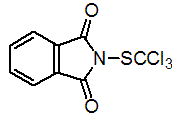
Mol. Weight: 296.56 g/mol
CAS No.: 133-07-3
Specifications
Leading Folpet supplier
Folpet 80% WDG
Folpet 95% TC
Packing:
BULK PACKING
Solid: 25kg/Bag, 25kg/Drum, 50kg/Drum etc.
SMALL PACKING
Solid: 1kg/Alu bag, 500g/Alu bag, 200g/Alu bag, 100g/Alu bag, 50g/Alu bag, 15g/Alu bag etc.
Customerized packing label
Folpet FAO standard
Professional registration
HAZARDS IDENTIFICATION
Hazard statement(s)
H317: May cause an allergic skin reaction.
H330: Fatal if inhaled.
H351: Suspected of causing cancer.
H361: Suspected of damaging fertility or the unborn child.
H400: Very toxic to aquatic life.
H410: Very toxic to aquatic life with long lasting effects.
Precautionary statement(s)
P201: Obtain special instructions before use.
P202: Do not handle until all safety precautions have been read and understood.
P260: Do not breathe dust/fume/gas/mist/vapors/spray.
P261: Avoid breathing dust/fume/gas/mist/vapors/spray.
P271: Use only outdoors or in a well-ventilated area.
P272: Contaminated work clothing should not be allowed out of the workplace.
P273: Avoid release to the environment.
P280: Wear protective gloves/protective clothing/eye protection/face protection.
P281: Use personal protective equipment as required.
P284: [In case of inadequate ventilation] Wear respiratory protection.
P302+P352: IF ON SKIN: wash with plenty of water.
P304+P340: IF INHALED: Remove person to fresh air and keep comfortable for breathing.
P308+P313: IF exposed or concerned: Get medical advice/attention.
P310: Immediately call a POISON CENTER or doctor/physician.
P320: Specific treatment is urgent (see ... on this label).
P321: Specific treatment (see ... on this label).
P333+P313: IF SKIN irritation or rash occurs: Get medical advice/attention.
P363: Wash contaminated clothing before reuse.
P391: Collect spillage.
P403+P233: Store in a well-ventilated place. Keep container tightly closed.
P405: Store locked up.
P501: Dispose of contents/container to ...
Supplemental Hazard Statements: none
MAMMALIAN TOXICOLOGY
Acute toxicity: 1) Acute oral LD50 for rat (male): >2000 a.i.mg/kg. 2) Acute dermal LD50 for rat: >2000 a.i.mg/kg. 3) Inhalation LC50 (4 h) for rat: 1.89 a.i. mg/L. 4) Mildly irritating to skin (rabbits). 5) irritating to eyes (rabbits). 6) Skin sensitiser (guinea pigs). NOEL: In 1 y feeding trials, no ill-effect or tumour incidence was noted in albino rats receiving 800 ppm/kg diet, nor in dogs receiving 325 ppm/kg for 5 d/w. NOAEL (oncogenicity) for mice is 450 ppm. No effect was observed on reproductive performance in rats over 3 generations at 1000 mg/kg diet; no teratogenic effect was noted in hamsters, monkeys or rats.
ADI (JMPR): 0.1 mg/kg b.w.[2007]
Classification:
Toxicity class WHO (a.i.): U (Unlikely to present an acute hazard)
US EPA Classification (formulation): IV (Caution - Not acutely toxic)
EC Risk Classification: Carcinogen category 3: R40; Xn - Harmful: R20, R43; Xi - Irritant: R36; N - Dangerous for the environment: R50
ECOTOXICOLOGY
Effect on birds: low toxicity to birds, acute LD50 for Bobwhite quail is >2510 a.i.mg/kg. Effect on fish: moderate toxicity to fish, acute 96 hour LC50 for Rainbow trout is 0.233 a.i.mg/L. Effect on aquatic invertebrates: moderate toxicity to aquatic invertebrates, acute 48 hour EC50 for Daphnia magna is 0.68 a.i.mg/L. Effect on algae: low toxicity to algae, acute 72 hour EC50 for Scenedesmus acutus is > 10 a.i.mg/L. Effect on honeybees: low toxicity to honeybees, contact acute 48 hour LD50 is >200 a.i.μg/bee, oral acute 48 hour LD50 is >236 a.i.μg/bee. Effect on earthworms: moderate toxicity to earthworms, acute 14 day LC50 is >500 a.i.mg/kg.
ENVIRONMENTAL FATE
Folpet's production and use as a fungicide-bactericide for vinyls, paints, and enamels may result in its release to the environment through various waste streams. Its use as an agricultural fungicide will result in its direct release to the environment. If released to air, a vapor pressure of 1.57×10-7 mm Hg at 25 deg C indicates folpet will exist in both the vapor and particulate phases. Vapor-phase folpet will be degraded in the atmosphere by reaction with photochemically-produced hydroxyl radicals; the half-life for this reaction in air is estimated to be 8 hours. Particulate-phase folpetwill be removed from the atmosphere by wet or dry deposition. The UV spectrum of folpet in hexane shows no absorbance at wavelengths above 300 nm, and therefore folpet is not expected to be susceptible to direct photolysis by sunlight. If released to soil, folpet is expected to have very high mobility based upon a Koc range of 7.47 to 21.9. Volatilization from moist soil surfaces is not expected to be an important fate process based upon an estimated Henry's Law constant of 7.7×10-8 atm-cu m/mole. Folpet may not volatilize from dry soil surfaces based upon its vapor pressure. Soil metabolism studies report degradation half-lives of 2.4-2.5 days under aerobic conditions and <7-15 days under anaerobic conditions, suggesting that folpet biodegradation is an important environmental fate process in soil. If released into water, folpet is not expected to adsorb to suspended solids and sediment based upon the Koc range. Biodegradation data in water were not available. Volatilization fromwater surfaces is not expected to be an important fate process based upon this compound's estimated Henry's Law constant. An BCF range of 19 to 81 suggests bioconcentration in aquatic organisms is low to moderate. Folpet rapidly undergoes chemical hydrolysis in aqueous solution with half-lives of 2.6 hours, 1.1 hours, and 67 seconds at pH 5, 7, and 9, respectively. Occupational exposure to folpet may occur through inhalation and dermal contact with this compound at workplaces where folpet is produced or used. Monitoring data indicate that the general population may be exposed to folpet via inhalation of ambient air and ingestion of food. (SRC)
Usage: Fungicide reported by A. R. Kittleson (Science, 1952, 115, 84). Introduced by the Standard Oil Development Co. and later by Chevron Chemical Co. Patents: US 2553770; US 2553771; US 2553776. Manufacturers: Makhteshim-Agan.
Application: Non-specific thiol reactant, inhibiting respiration. Foliar fungicide with protective action. Used to control of downy mildews, powdery mildews, leaf spot diseases, scab, excoriosis, black rot, white rot, Gloeosporium rots, Botrytis, Alternaria, Pythium, and Rhizoctonia spp. in pome fruit, stone fruit, soft fruit, citrus fruit, vines, olives, hops, potatoes, lettuce, cucurbits, onions, leeks, celery, tomatoes and ornamentals. Phytotoxicity Non-phytotoxic, except to sweet cherries and the D'Anjou variety of pears. Russetting is possible in sensitive apple varieties, if applied early in cropping.
| 






